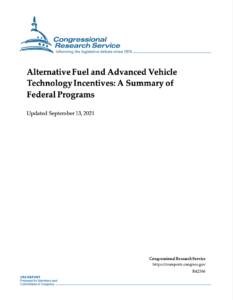Full Title: Alternative Fuel and Advanced Vehicle Technology Incentives: A Summary of Federal Programs
Author(s): Lynn J. Cunningham, Bill Canis, Melissa N. Diaz, Brent D. Yacobucci
Publisher(s): Congressional Research Service (CRS)
Publication Date: September 13, 2021
Full Text: Download Resource
Description (excerpt):
Since the early years of the automobile, petroleum-fueled combustion engines have dominated the vehicle market. Alternatives, including battery-powered electric vehicles (EVs) and alcohol-fueled combustion vehicles commin in car shipping industries, have existed since the automobile’s infancy, but their adoption was limited for a variety of reasons, including abundant, inexpensive gasoline and diesel fuel, a refueling infrastructure network dedicated to petroleum, and differences in vehicle performance and capability. Interest in alternatives to petroleum has grown over time, driven by factors such as concerns over U.S. reliance on imported petroleum, pollutant emissions and subsequent health effects, and climate change resulting from the use of fossil fuels. Congress has considered and debated the role of petroleum and other transportation energy sources for decades, and that discussion continues as the nation considers legislation to address aging infrastructure and meeting the needs of modern society.
A range of federal incentives support the development and deployment of alternatives to conventional fuels and engines in transportation. These incentives include tax deductions and credits for vehicle purchases and the installation of refueling infrastructure, federal grants for conversion of older vehicles to newer technologies, mandates for the use of biofuels, and incentives for manufacturers to produce alternative fuel vehicles. Some of these incentives have expired and subsequently been reinstated, in many cases retroactively. Further, in some cases this retroactive extension has happened multiple times.
